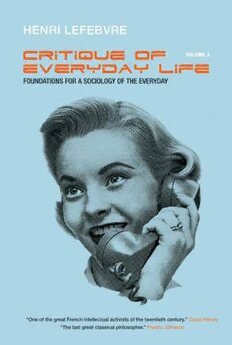
Critique of Everyday Life, Vol. 2: Foundations for a Sociology of the Everyday PDF
213 Pages·2008·27.558 MB·English
Most books are stored in the elastic cloud where traffic is expensive. For this reason, we have a limit on daily download.
Preview Critique of Everyday Life, Vol. 2: Foundations for a Sociology of the Everyday
Description:
Identifies categories within everyday life, such as the theories of the semantic field and of moments. Henri Lefebvre’s three-volume Critique of Everyday Life is perhaps the richest, most prescient work by one of the twentieth century’s greatest philosophers. The first volume presented an introduction to the concept of everyday life. Written twenty years later, this second volume attempts to establish the necessary formal instruments for analysis, and outlines a series of theoretical categories within everyday life such as the theory of the semantic field and the theory of moments.The moment at which the book appeared—1961—was significant both for France and for Lefebvre himself: he was just beginning his career as a lecturer in sociology at Strasbourg, and then at Nanterre, and many of the ideas which were influential in the events leading up to 1968 are to be found in this critique. In its impetuous, often undisciplined prose, the reader may catch a glimpse of how charismatic a lecturer Lefebvre must have been.
See more
The list of books you might like
Most books are stored in the elastic cloud where traffic is expensive. For this reason, we have a limit on daily download.
